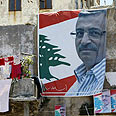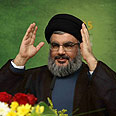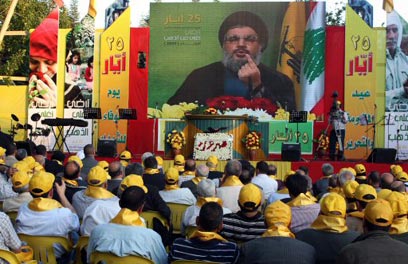

Lebanese voted in a parliamentary election on Sunday in which the Iranian-backed Hizbullah and its allies will try to overturn the majority held by their Western-backed rivals.
Polling stations opened at 0400 GMT and some 50,000 members of the security forces fanned out over the 26 electoral districts to guard against violence, focusing on areas where competition is expected to be tightest.
"Democracy is a blessing that we must preserve, a blessing that distinguishes Lebanon in the Middle East," President Michel Suleiman told reporters after voting in his hometown in Jbeil district, north of Beirut.
He urged Lebanese to vote, calling it "an important act that should be done calmly and with joy so that afterwards we can start to build Lebanon".
Ali Breiyteh, 25, a taxi driver, said "there won't be any major problems today, but when the result is announced tomorrow, there could be a big problem," said
The election, in which Christians are seen as the deciding voters because they back rival groups, will shape the government for the next four years. Armored personnel carriers dotted the streets of Beirut's Christian Ashrafiyeh district.The election is seen as a tight contest between coalitions at odds over issues including the fate of Hizbullah's powerful guerrilla army and relations with neighboring Syria, which dominated Lebanon until 2005.
Some polls forecast a narrow victory for the Shiite Hizbullah, which is backed by Syria and Iran, and its allies, including Christian leader Michel Aoun.

Hizbullah rally (Photo: AFP)
But many expect the formation of a broad coalition cabinet, including parties from both sides, regardless of the result.
The United States, which lists Hizbullah as a terrorist group, has linked future aid to Lebanon to the shape and policies of the government that replaces the current national unity cabinet. Hizbullah is part of the present government.
'Threat to Lebanese entity'
The "March 14" majority coalition, led by Sunni politician Saad al-Hariri, has enjoyed firm backing from the United States and other countries including Saudi Arabia. It opposes the influence of Syria which dominated Lebanon until 2005.
The alliance won elections that followed the assassination of Hariri's father, Rafik, in 2005, but struggled to govern in the face of a paralyzing and sometimes violent power struggle with Hizbullah and its allies.
"The day of choice, decision and democracy," Hariri's Mustaqbal newspaper said on Sunday.
Being conducted under a new law, this year's election will largely be decided by the voting in divided Christian districts. Aoun, a former army commander, faces Christian rivals in the shape of the Phalange party of former president Amin Gemayel and the Lebanese Forces of Samir Geagea.
The influential Christian Maronite Patriarch Nasrallah Boutros Sfeir on Saturday warned of "a threat to the Lebanese entity and its Arab identity" in remarks seen as a veiled attack on the Iran-backed Hizbullah.
Much of the campaigning has focused on the group's guerrilla army, which is stronger than the state's security forces.
Opponents say Hizbullah's weapons undermine the state, while the group and its allies see them as crucial to defending Lebanon against Israel.
Tensions in Lebanon have mostly been kept in check by leaders whose rivalries pushed the country to the brink of civil war last year. A thaw in ties between Saudi Arabia and Syria is has also helped maintain stability in Lebanon in recent months.
About 200 international observers are monitoring the vote.
Former US President Jimmy Carter, who heads a team of international observers, urged the Lebanese parties and their foreign backers to accept the result of the vote.
"I don't have any concerns over the conduct of the elections. I have concerns over the acceptance of the results by all the major parties," Carter said after visiting a polling station in Beirut.
"All the international observers hope and encourage all the parties to accept the result of the election whether they win or lose."















